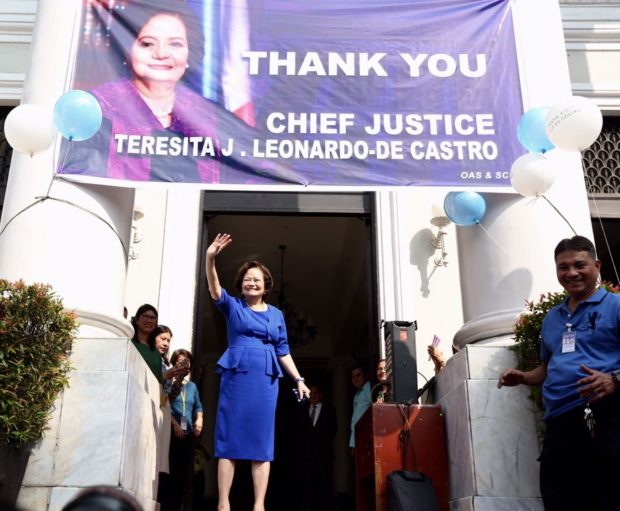
Retiring Chief Justice Teresita Leonardo de Castro waves to supporters and employees of the Supreme Court as she leads her last flag-raising rite at the high tribunal on Monday, Oct. 8, 2018. (Photo by MARIANNE BERMUDEZ /Philippine Daily Inquirer)
The Supreme Court approved and implemented 32 reforms and projects under Chief Justice Teresita Leonardo-de Castro, who formally assumed office on Aug. 25, 2018.
Under De Castro’s watch, the high court implemented the increase of the monthly salary of first-level court judges all over the country.
READ: Salary grade 28: SC hikes judges’ pay to P127,000
She also convened the Justice Sector Coordinating Council (JSCC) after a lull of three years lull.
During the meeting, the JSCC approved the launch of the second Justice Zone in Cebu City as well as the creation of technical working groups on planning, budgeting, data reconciliation and evidence management system.
She also led the SC in approving a new rule for direct payment of legal fees through over-the-counter payments in Land Bank of the Philippines branches and the increase fees for mediators and stenographers.
READ: CJ approves testing of direct-to-bank payment of legal fees in Valenzuela
The high court also approved the construction of halls of justices for Tanay in Rizal and Cagayan de Oro City in Misamis Oriental.
It also approved the terms of reference for the consultancy service for the implementation of the Judiciary Case Management System and the consultancy service for the judiciary’s comprehensive Enterprise Resource Planning System. This is among the priority projects De Castro mentioned during her interview with the Judicial and Bar Council (JBC).
Several rules were also approved, including the applicability of the “Revised Guidelines for Continuous Trial of Criminal Cases” to family courts and regional trial courts handling family court cases and the PHILJA “Revised Guidelines on Mediation” and instructed PHILJA to train mediators who would specialize on the mediation of family cases.
The high court also approved the proposed additional cost of living allowance for justices, judges, officials and employees for the month of August chargeable to the 80-percent judiciary development fund as well as an additional grant of a rice subsidy allowance for first and second quarters of this year.
There will also be an increase in the mediators’ fees in the first and second level courts from P1,150.00 to P1,500 for every successfully mediated case, and to maintain the payment of P500 for unsuccessfully mediated cases, provided that the number of unsuccessfully mediated cases to be paid each mediator will be increased from three to five cases a month, on the recommendation of the PHILJA.
During De Castro’s stint, the high court en banc also managed to expedite pending applications, appointments to key vacancies in the high court that have remained vacant for years.
Last Sept. 4, the SC named Davao City Regional Trial Court Judge Leo Madrazo as deputy court administrator for Mindanao. This position has been vacant for over a year, or since July 2017.
The high tribunal has also named lawyer Ma. Carina Cunanan as SC deputy clerk of court and chief administrative officer, with her appointment paper released also last Sept. 4.
This position, on the other hand, has been vacant since December last year. The high court also appointed lawyer Librada Buena as new SC first division clerk of court in place of clerk of court Felipa Anama, who retired from the judiciary earlier this year.
De Castro’s key projects have been approved by the en banc as she promised to restore collegiality in her short stint at the SC.
During retirement rites for De Castro last Friday, Oct. 5, Senior Associate Justice Antonio Carpio lauded her for “restoring dignity and harmony in the Supreme Court.” /atm